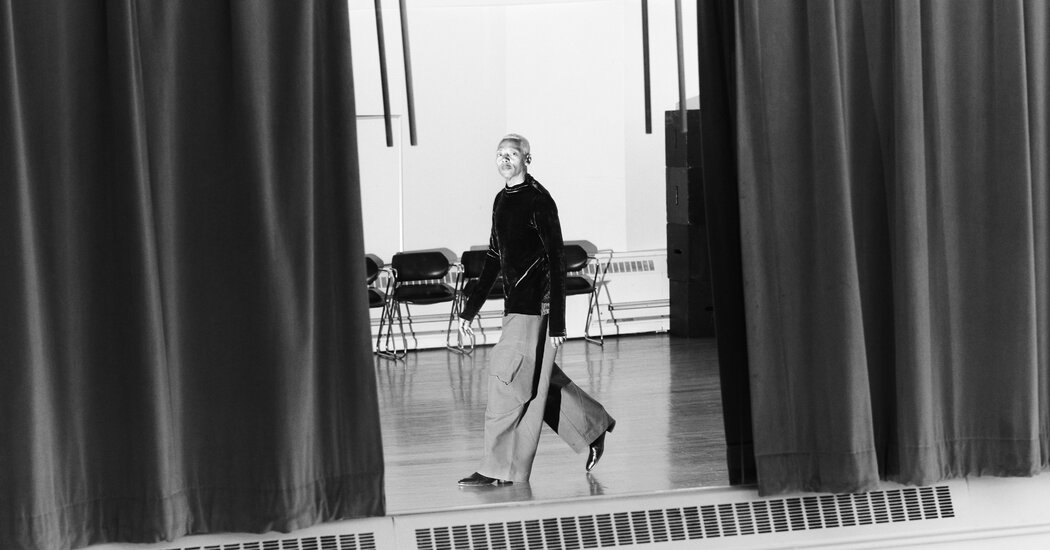At a recent performance of “Tomorrow Comes the Harvest” at BAM’s Howard Gilman Opera House, some in the audience danced in the aisles, and a fight started between percussionist Sundiata OM, who plays African talkies, and Detroit techno pioneer Jeff Mills Stirring rhythmic dialogue as he hammers away the beat on a Roland TR-909 drum machine. During the 90-minute performance, the musicians boldly blended techno, jazz and modern classical music, embodying the Art Ensemble of Chicago’s famous credo “Great Black Music, Ancient to the Future.”
Tomorrow Comes the Harvest began in 2018 as a collaboration between Mills and Afrobeat founder Tony Allen (Fela’s long-time drummer). Despite the differences in their styles, they created a sonic language—based entirely on improvisation rather than typical technical trademarks—that Mills found extremely fruitful, even after Allen’s death in 2020. I also want to continue this language. “My hope,” Mills said in a backstage interview, “is that Tomorrow Is Harvest becomes a way of playing music—not always the same sound, but figuring out the idea of it as you play it.”
Mills has carved a unique path over the past four decades: from his roots as Detroit nightclub and FM radio DJ the Wizard in the 1980s to his work with the politically conscious Motor City techno collective Underground Resistance in the early ’90s , to his solo work that helped define the sleek, stripped-down minimal techno genre. While Mills has always been known as a dazzling DJ, he’s continually expanded his horizons beyond the booth, including high-concept album projects starting with X-102’s “Discovers the Rings of Saturn” in 1992, all the way up to his A new LP, “The Trip — Enter the Black Hole,” was released on vinyl last week via his own Axis label.
Mills took the name “Tomorrow’s Harvest” from a phrase coined by science fiction writer Octavia Butler, who described the potential power of properly sown seeds to influence the future. The metaphor seems fitting for Mills’ entire career, which has inspired generations of electronic musicians such as Mali Mase, the 25-year-old DJ and producer who released Sweater on Polo.
“To me, Jeff Mills demonstrates virtuosity not only in the technical aspects, but in all forms of expression that he explores,” Mays said. A set was produced for Mills at the annual black-focused techno music festival. “It’s so easy for him to sit back and soak in his own vision of greatness. Instead, he challenges established forms, reinvents, and remains more morbid than anyone on a drum machine.
Mills, 60, has a low-key coolness befitting his role as one of techno’s elder statesmen. In conversation, he is thoughtful but soft-spoken, gently pitching visionary ideas between sips of tea. His stylish outfit—an olive velvet Jil Sander turtleneck by Pet-tree-kor design house paired with wide-leg trousers and his recently dyed blond hair—seemed fitting for “The Man from Tomorrow” (2014) French Fashion Week title). In a text message, veteran Detroit music producer and DJ Theo Parrish called Mills “an example of how to get out of nightlife and into proper art.”
“The Trip” is the soundtrack to a live multimedia work billed as “the world’s first cosmic opera,” which Mills and avant-garde singer Jun Sokawa performed in Tokyo last month. The project – Mills’s attempt to grapple with what might happen if humans travel to and through black holes in spacecraft – expresses the potential distortions of time and reality through shimmering atmospheres, propulsive hits, swirling synth storms and interstellar sound effects.
Space travel is a running theme in Mills’ work, a fascination dating back to his childhood watching reruns of the 1960s TV show Lost in Space. Mills said the live show in Tokyo required nearly a year of preparation, hiring dancers, choreographers and costume designers. He said he even went to Las Vegas to study casino performances to better reimagine electronic music and how audiences could engage with it.
“I always like the more innovative parts of music, the conceptual parts, because that’s closer to comics,” Mills said. “I’ve always had this idea that music should be like this: you should hear something and take it away.”
On opening night of “The Inhabitants” last year, Mills premiered an updated version of Fritz Lang’s 1927 silent sci-fi classic “Metropolis” score (he composed an earlier version in 2000) to a young audience at the festival. found a receptive audience. “He was a teacher, and I appreciate that his music provided a space for reflection and provided a blueprint for how to imbue music with its liberating potential,” said Ryan C. Clarke, the festival’s director of educational programming. “When he was mixing as the Wizard in WJLB, he was like Charlie Parker in Minton’s Playhouse. We’re still grappling with the complexity he brings to the music.
In fact, Mills is a renaissance man in the tech world. In addition to Metropolis, he composed scores and “cinemixes” for several silent films. He has recorded classical versions of electronic music tracks with the Montpellier Philharmonic Orchestra in France, electronic jazz as Paradox and Latin jazz as Zanza 22. He became the spokesperson.
“I’m not interested in fashion,” Mills said. “It’s people and how we develop. The clothes we wear are an extension of who we are and who we want to be. Clothes or a second skin shows our ambition. It shows where we want to go.
Mills started DJing in high school, tinkering with his brother’s disco records, and by his late teens, his skills were worthy of his chosen nickname, “The Wizard.” At 20, he became known for spinning at Detroit clubs like Cheeks and soon joined Detroit radio station WDRQ. There (and later at WJLB), he made a splash with his dizzying, high-speed mixes of hip-hop, electronic and industrial music on three turntables; Mills explains that WDRQ brass were terrified of his pyrotechnic scratching Rub would break a pin on the air, and they placed an emergency third spinner nearby, and he eventually started using all three.
In 1989, he teamed up with former Parliament-Funkadelic session musician Mike Banks and rapper-producer Robert Hood to produce Underground Resistance, techno’s answer to Public Enemy, which espoused a defiant philosophy of DIY self-reliance. With the motto “hard music from a hard city”, the trio brought a new aggressiveness to Detroit techno, which had a huge impact on the development of the German techno scene. In a text message, Banks described their global role as “sound ambassadors.”
Mills left Detroit for New York, becoming the resident DJ at Limelight, then spent the next thirty years traveling between Chicago and Berlin. He moved his studio to Miami a few years ago, although he spends most of his time in Paris. However, he and his wife also recently bought an apartment in downtown Detroit, where he said he plans to launch a long list of projects. “It should be a city that inspires and develops ideas and creates them from scratch,” he said.
Tomorrow Comes the Harvest was presented at BAM as part of the Long Play Music Festival, curated by experimental music organization Bang on a Can. David Lang, one of the orchestra’s founders, said there was a connection between Mills’ orchestra and the rich pulse of works like Steve Reich’s “Music for 18 Musicians” . “Jeff Mills has always noted his commitment to minimalism,” Long said, “reducing musical ornamentation and focusing on structure, and you can hear all of that here, loud and clear.”
The band’s BAM show was Mills’ largest non-DJ gig in the United States, but he hopes for bigger shows within his confines. “We can really work on creating more of an experience than just a musical performance,” he said. “We can really create magic. We need to make the audience disappear and reappear somewhere else. That’s what we should be working on.




